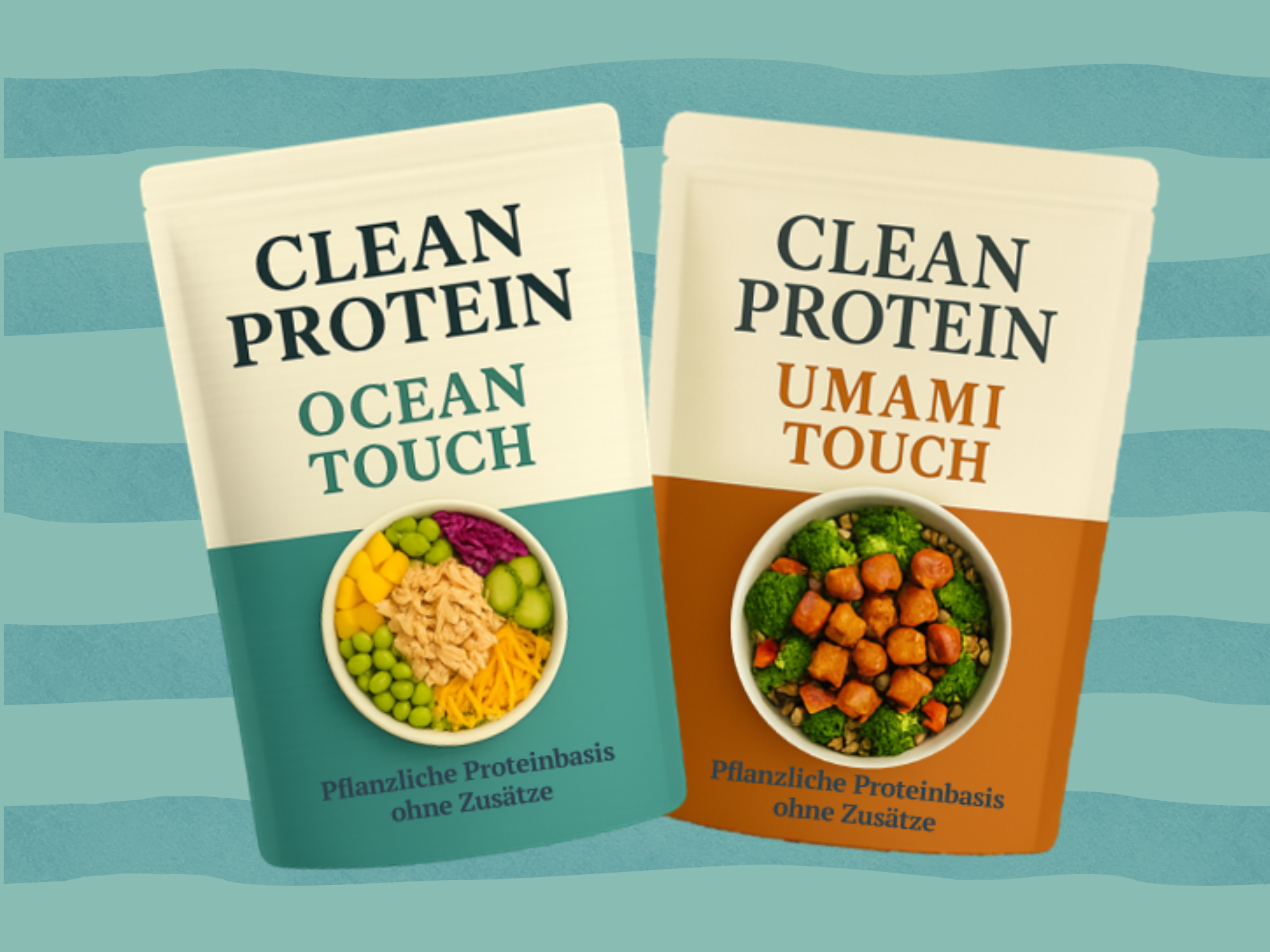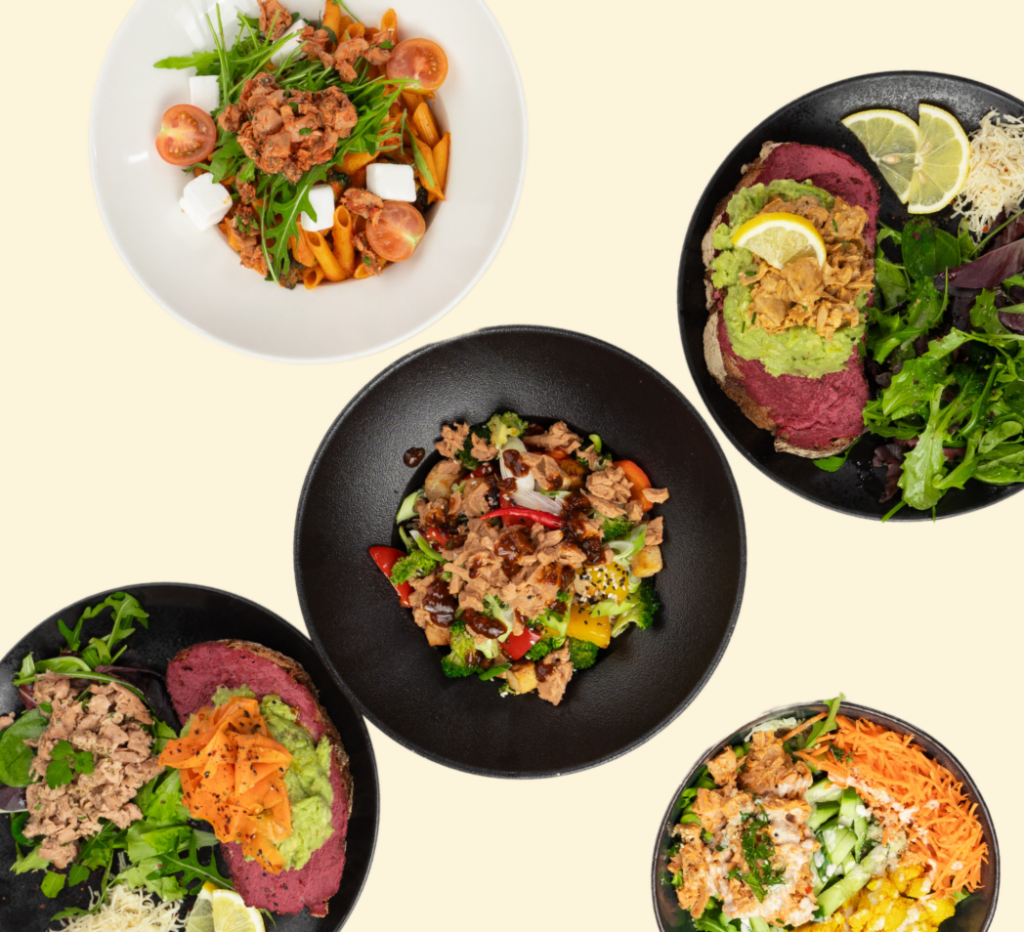
German alternative protein startup Happy Ocean Foods has bid farewell to its plant-based seafood portfolio, instead embracing a Clean Protein philosophy to meet consumer trends.
As clean eating becomes the norm for more and more Europeans, one plant-based seafood startup is shifting its focus to cater to their needs.
Munich-based Happy Ocean Foods, which made its name with vegan shrimp and tuna, has scrapped its seafood alternative lineup. Instead, it’s now focusing on a Clean Protein System, which offers functional plant protein bases for the foodservice sector.
“The market is overflowing with imitations – but what is missing are functional protein solutions that work in real kitchens and at the point of service,” said co-founder Julian Hallet. “That’s why we at Happy Ocean Foods are now focusing on Clean Protein.”
The firm has now launched Ocean Touch and Umami Touch, two products that still evoke either the sea or animal protein, but are made to stand on their own and deliver high amounts of protein with fewer ingredients.
Happy Ocean Foods taps into Europe’s clean-label push

The company describes the Clean Protein System as a tool that offers next-gen plant-based components tailor-made for caterers and foodservice operators. They require no cutting or marination, offer price flexibility and supply stability, and can be used in a range of applications, including bowls, wraps and salads.
The Ocean Touch product comprises flakes that can be used cold or lukewarm. They’re made from a base of pea protein isolate and rice flour, which are mixed with rapeseed oil, pea fibre, microalgae oil, and flavourings. Available in natural and lemon-herb variants, it contains 21g of protein per 100g, with 1g of fibre and omega-3 from DHA and EPA.
Meanwhile, Umami Touch is sold as cubes in spicy and Mediterranean flavours, and is described as having a “meaty bite”. It comprises pea protein isolate, fava bean protein, rice flour, rapeseed oil, salt, and natural flavours, and has 22g of protein and 1g of fibre per 100g.
“With our deep expertise in wet extrusion and functional protein blends, we’re creating ready-to-use, allergen-free protein bases for modern foodservice concepts. These components are made to simplify kitchen processes while maximising flavour, texture and nutritional value – to deliver on every level,” the company wrote on LinkedIn.
Happy Ocean Foods’s pivot comes amid a rise in clean eating in Europe. Research shows that one in two consumers now prefer a clean-label approach to healthy eating, while two-thirds reconsider purchases based on ingredient lists. Germany, in fact, is the most active country for clean-label product launches.
A 2024 survey revealed that 73% of Europeans are looking for products with recognisable ingredients, and up to 55% are willing to pay more for those with natural claims. The trend is tied to healthy eating, with 81% of consumers citing health as an important driver of daily food choices.
Meanwhile, despite Germany being the largest market for plant-based food outside the US, concerns around ultra-processed food continue to plague producers of meat and seafood analogues. Vegan seafood is one of the least popular animal-free food categories in the country, with only a fifth of consumers eating it in the last year. And that’s despite 38% wanting to increase their consumption of plant-based food.

Plant-based category ‘missing healthy, high-protein solutions’
Happy Ocean Foods began in 2025, with Hallet and co-founder Robin Drummond targeting the demand for healthier, more sustainable proteins. It launched Happy Srump in 2022, followed by Happy Tyuna in 2024, before unveiling the Clean Protein products this year. It’s also working with reserach partners on further innovations.
“When we founded Happy Ocean Foods over five years ago, we weren’t interested in catering to the next vegan hype,” Hallet said. “We were interested in something very simple: to meet the growing protein demand in our society with high-quality, plant-based sources – varied, nutritious and without animal origin.”
He continued: “We started with fish alternatives because there were no alternatives in this category despite overfishing. But today, we know it is very difficult to keep track of the category and identify really good products, [and] what is missing are healthy and high-quality protein solutions that impress with their taste and versatility and integration at all levels.”
Hallet revealed that after consulting many sales partners in the last few months, the company found some key opportunities for growth: cleaner labels, higher protein, quick and flexible use, and a formulation free from soy, wheat and other allergens.
“For us, this is not a pivot. It is the logical continuation of why we founded Happy Ocean Foods: good food, good nutritional values, good impact,” he said. “Not as a replacement, but as a solution.”

It’s not the only company that has pivoted or diversified from vegan alternatives to standalone plant proteins. Austria’s Revo Foods recently launched The Prime Cut, a 3D-printed mycoprotein fillet described as a “new class of performance nutrition that doesn’t try to imitate meat”. And in the UK, leading plant-based meat brand This introduced a Super Superfood product packed with whole foods and meant to rival tofu and tempeh.
And this week, industry giant Beyond Meat said it has dropped ‘Meat’ from its name to focus on traditional plant proteins, ahead of launching a new Ground product with four ingredients: fava beans, potato starch, water, and psyllium husk.
“Instead of thinking about a simple replacement for animal protein, what if you just thought about your daily protein consumption, and I started to try to replace as much of that as I can with plant protein, any form that I could?” CEO Ethan Brown told Fast Company. “You’ll see us come out with things like, maybe, lentil sausage. Or chickpea hot dogs.”
The post Happy Ocean Foods Ditches Vegan Seafood for ‘Clean’ Plant Protein appeared first on Green Queen.
This post was originally published on Green Queen.